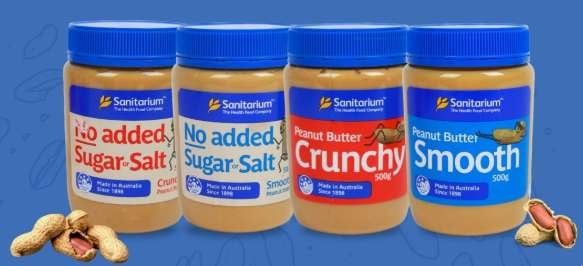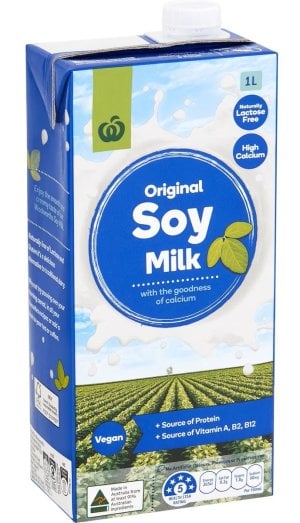Major Aussie food brand ceases production for one breakfast staple
By
Danielle F.
- Replies 53
Breakfast has been referred to as the most important meal of the day.
Whether you like them sweet or savoury, several pantry staples elevate meals and give us the energy to go through the day.
Yet, surprising news about a particular brand has spread and left many food fans in disbelief.
Homegrown food brand Sanitarium announced that it will no longer produce its range of peanut butter spreads.
This decision marked the end of a century-long tradition, as the company decided to shift its focus to other products.
Sanitarium, famous for its Weet-Bix breakfast cereal, has been a staple in Australian pantries for generations.
However, the company confirmed that it stopped producing all peanut butter products as of July.
Sanitarium cited the 'declining customer demand and growth of other favourites' as primary reasons.
'Our people have proudly produced every jar made, and we thank all our loyal consumers over the last 100 years for loving our quality range of peanut butter,' a Sanitarium spokesperson shared in a statement.
'Sanitarium understands that this may be sad news to some consumers, and we sincerely apologise for any disappointment caused.'
The discontinuation of Sanitarium's peanut butter line followed its earlier decision to cease several breakfast cereals in New Zealand.
By 2025, Sanitarium will stop rolling out its muesli, granola, cluster, and puff cereals.
This move reflected a broader trend—research showed that 20 per cent of Kiwis have been opting for alternatives like hot drinks or liquid breakfasts.
Sanitarium's General Manager for New Zealand, Michael Barton, highlighted the changing consumer habits.
'The breakfast market is changing, and we have seen a global move away from some cereal formats,' Mr Barton shared.
'We need to align our production with evolving consumer appetites and demand trends.'
Marketing experts, including Professor Bodo Lang, shared that Sanitarium's exit from the peanut butter market is a strategic decision to tighten its product portfolio.
This should allow the company to concentrate on core brands like Weet-Bix and Up&Go.
In a related development, the Australian Competition and Consumer Commission (ACCC) recently approved Sanitarium's acquisition of Vita Brits.
Before the acquisition, Vita Brits was a brand under Uncle Toby's, a subsidiary of Nestle.
The ACCC concluded that the acquisition would not substantially lessen competition, as consumers do not typically switch between Weet-Bix and Vita Brits.
Founded in Melbourne in 1898, Sanitarium has a rich history and presence in Australia and New Zealand.
The Seventh-day Adventist Church wholly owns the company and has been a significant player in the health food industry for over a century.
As we bid farewell to Sanitarium's peanut butter, it's a reminder of the ever-changing consumer goods landscape and the importance of adapting to new markets.

What will you miss most about Sanitarium's peanut butter items? Have you found a replacement for it already? Join the conversation and share your memories about Sanitarium's peanut butter line in the comments section below!
Whether you like them sweet or savoury, several pantry staples elevate meals and give us the energy to go through the day.
Yet, surprising news about a particular brand has spread and left many food fans in disbelief.
Homegrown food brand Sanitarium announced that it will no longer produce its range of peanut butter spreads.
This decision marked the end of a century-long tradition, as the company decided to shift its focus to other products.
Sanitarium, famous for its Weet-Bix breakfast cereal, has been a staple in Australian pantries for generations.
However, the company confirmed that it stopped producing all peanut butter products as of July.
Sanitarium cited the 'declining customer demand and growth of other favourites' as primary reasons.
'Our people have proudly produced every jar made, and we thank all our loyal consumers over the last 100 years for loving our quality range of peanut butter,' a Sanitarium spokesperson shared in a statement.
'Sanitarium understands that this may be sad news to some consumers, and we sincerely apologise for any disappointment caused.'
The discontinuation of Sanitarium's peanut butter line followed its earlier decision to cease several breakfast cereals in New Zealand.
By 2025, Sanitarium will stop rolling out its muesli, granola, cluster, and puff cereals.
This move reflected a broader trend—research showed that 20 per cent of Kiwis have been opting for alternatives like hot drinks or liquid breakfasts.
Sanitarium's General Manager for New Zealand, Michael Barton, highlighted the changing consumer habits.
'The breakfast market is changing, and we have seen a global move away from some cereal formats,' Mr Barton shared.
'We need to align our production with evolving consumer appetites and demand trends.'
Marketing experts, including Professor Bodo Lang, shared that Sanitarium's exit from the peanut butter market is a strategic decision to tighten its product portfolio.
This should allow the company to concentrate on core brands like Weet-Bix and Up&Go.
In a related development, the Australian Competition and Consumer Commission (ACCC) recently approved Sanitarium's acquisition of Vita Brits.
Before the acquisition, Vita Brits was a brand under Uncle Toby's, a subsidiary of Nestle.
The ACCC concluded that the acquisition would not substantially lessen competition, as consumers do not typically switch between Weet-Bix and Vita Brits.
Founded in Melbourne in 1898, Sanitarium has a rich history and presence in Australia and New Zealand.
The Seventh-day Adventist Church wholly owns the company and has been a significant player in the health food industry for over a century.
As we bid farewell to Sanitarium's peanut butter, it's a reminder of the ever-changing consumer goods landscape and the importance of adapting to new markets.
Key Takeaways
- Sanitarium announced it will cease production of peanut butter products due to declining customer demand.
- The company stopped production in July and apologised to its consumers, who may have been disappointed by the decision.
- Sanitarium also winded down production on a number of breakfast cereals in New Zealand.
- The Australian Competition and Consumer Commission (ACCC) recently approved Sanitarium's acquisition of the Vita Brits from Uncle Toby's.









